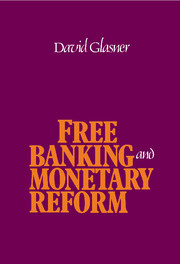Book contents
- Frontmatter
- Contents
- Preface
- Acknowledgments
- PART I A THEORY OF MONETARY INSTITUTIONS
- PART II THE UNCERTAIN PROGRESS OF MONETARY THEORY AND MONETARY REFORM
- PART III A COMPETITIVE MONETARY REGIME
- 8 The competitive breakthrough
- 9 Can competitive banking be safe and stable?
- 10 Why we need a new monetary regime
- 11 A proposal for monetary reform
- References
- Index
9 - Can competitive banking be safe and stable?
Published online by Cambridge University Press: 16 September 2009
- Frontmatter
- Contents
- Preface
- Acknowledgments
- PART I A THEORY OF MONETARY INSTITUTIONS
- PART II THE UNCERTAIN PROGRESS OF MONETARY THEORY AND MONETARY REFORM
- PART III A COMPETITIVE MONETARY REGIME
- 8 The competitive breakthrough
- 9 Can competitive banking be safe and stable?
- 10 Why we need a new monetary regime
- 11 A proposal for monetary reform
- References
- Index
Summary
[The national guarantee system] proposes to tax good banks to support bad; to penalize honesty, ability, experience and training to compensate for incompetency, dishonesty and ignorance; it removes from banking the essential characteristic on which success in the business has been based, viz., … a reputation for prudence, foresight, sagacity and conservatism. It proposes to place the reckless and speculative banks on the same level with the best managed and the most conservative, which will lead to competition calculated to drag all of them down to the least meritorious.
Chicago Clearing House Association (1932)Metaphorically, deposit-insurance authorities are paying deposit-institution managers to overload the deposit-insurance jalopy, to drive it too fast, and even to break dance on its hood as it careens through interest rate mountains and over back country roads.
Edward Kane, The Gathering Crisis in Federal Deposit InsuranceCompetition in banking has always drawn criticism from those who believe it is destabilizing. Such criticism, as we have seen, was common in the eighteenth and nineteenth centuries. And when the banking collapse of the Great Depression seemed to validate those criticisms, a series of reforms turned banking into a heavily regulated industry. But now competition and financial innovation are transforming banking and breaking down the artificial barriers regulation has interposed between banks and other financial intermediaries.
- Type
- Chapter
- Information
- Free Banking and Monetary Reform , pp. 181 - 203Publisher: Cambridge University PressPrint publication year: 1989



